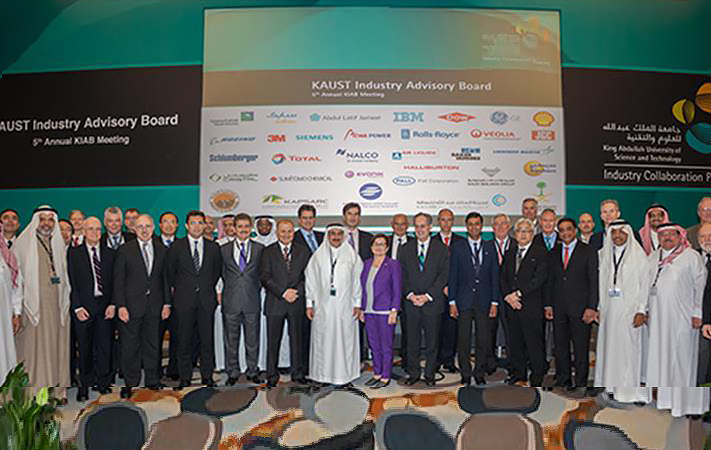Emphasis on innovation and not ‘black box’ solutions at annual KIAB meeting

KAUST Industry Advisory Board (KIAB)
The University recently held its 5th annual meeting of the KAUST Industry Advisory Board (KIAB). KIAB was established to ensure ongoing alignment of the University’s academic, research, and economic development activities and goals with industry. The advisory board’s members represent 27 Saudi and international corporations and five government agencies. The 5th KIAB meeting was an important event in advancing research and collaboratively developing research results for deployment in the Kingdom.
This year’s KIAB meeting featured numerous opportunities for members of the board to interact not only with senior KAUST management, but also with each other – an aspect which KAUST President Jean-Lou Chameau noted was important, adding that next year’s event should provide even more opportunities for the organizations to network. KAUST functioning as a connector and convener across the value chain is critical in fostering the Kingdom’s emerging innovation ecosystem.
Panel discussions and different talks and presentations by KAUST faculty and corporate representatives from industry featured prominently in this year’s activities.
In his presentation at the event, H.E. Dr. Abdulrahman M. Al-Ibrahim, Governor, Saline Water Conservation Corporation (SWCC), emphasized the strategic importance of partnerships with KAUST and KAUST Industry Collaboration Program (KICP) members. KICP includes 34 industry members and five honorary members representing key Saudi government agencies, and is the primary conduit for engaging industry in collaborative research with faculty. Dr. Al-Ibrahim noted that KAUST and its robust partnerships with industry and organizations like SWCC are key to transferring knowledge and innovation.
SWCC is not interested in “black box” solutions, Dr. Al-Ibrahim stated, reiterating the importance of developing human capital to localize and improve on holistic systems. The approach of integrating waste-heat and renewable energy-driven desalination demands interdisciplinary, “triple helix” partnerships among industry, academia, and government agencies, he explained, and such collaborations are the hallmark of KAUST, as exemplified by KIAB.
The value of industry partners’ presence at KAUST was emphasized throughout the event’s presentations. Fuad Mohammed Mosa, General Manager, Global Corporate Programs and Research and Innovation Centers, Saudi Basic Industries Corporation (SABIC), emphasized myriad opportunities created by SABIC’s tenancy at KAUST in bridging the gap between the University’s research and industry.
The role played by students in achieving the University’s economic development mission was also a focal point of the event’s presentations. The results of a Saudi Aramco project led by KAUST graduates now employed by the company at KAUST’s Innovation Cluster were highlighted by Dr. Ashraf Ghazzawi, Manager of Saudi Aramco’s Research & Development Center (R&DC). The three KAUST graduates designed, built, and field-tested a smart robotic device that monitors the integrity of difficult-to-access hydrocarbon pipes and vessels. The successful technology was designed, developed, and deployed at an accelerated pace.
In his closing remarks, President Chameau noted the University’s desire to create long-lasting, long-term partnerships with industry so that both industrial partners and KAUST will benefit most from these interactions. “We want our faculty and students actively involved [in these partnerships], as this is intellectual stimulation for them,” he stated. “They will be excited to work with [our partners] and vice-versa.”
President Chameau ended the event by adding that KIAB and the University’s interaction with industry is “helping to open doors to the Kingdom for more value-driven industry partnerships.”
Please enable JavaScript to view the comments powered by Disqus. comments powered by Disqus
